Squirrel Nut Caramels (chocolate flavored) and Squirrel Nut Zippers (vanilla flavored) were chewy caramel candy mixed with peanuts.
Squirrel Nut Caramels (chocolate flavored) and Squirrel Nut Zippers (vanilla flavored) were chewy caramel candy mixed with peanuts.
Chocolate Squirrel caramels were the original flavor of Squirrel Nut brand caramels. The ingredients are: corn syrup, sugar, peanuts, condensed milk, chocolate, partially hydrogenated soybean and/or cottonseed oil, natural & artificial flavor, salt, and soy lecithin.
Squirrel Nut Zippers, the vanilla nut caramel variety, were developed in the mid-1920s to complement the chocolate variety. [1]
Squirrel Nut Zippers contained peanuts and were sometimes passed out at performances by a band that shared the same name of Squirrel Nut Zippers. Squirrel Nut Zippers were small and tended to be soft and chewy, hardening quickly when outside of their packaging, while warming them slightly revived their chewy texture. [2]
Squirrel Nut Caramels were originally made by the Austin T. Merrill Company of Roxbury, Massachusetts in 1890. [3] It was soon reincorporated as the Squirrel Brand Company (1899-1999), which moved to North Carolina in 1903. In 1915, it moved its factory again to 12 Boardman Street in the Area 4 neighborhood of Cambridge, Massachusetts, where it remained until 1999. [4] That year, the company was sold and moved to McKinney, Texas, where a nut-processing operation continues. [5]
However, in 2004 the Necco company brought the Squirrel Nut candy brand back to Massachusetts, [3] where they were produced until Necco ceased operation in 2018.
In 2003, the former factory building in Cambridge was converted to affordable public housing apartments. [4] A public park and community gardening space, named Squirrel Brand Park, is now located next to the former factory. [6]
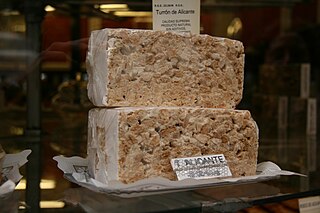
Turrón, torró or torrone is a Mediterranean nougat confection, typically made of honey, sugar, and egg white, with toasted almonds or other nuts, and usually shaped either into a rectangular tablet or a round cake. Turrón is usually eaten as a dessert food around Christmas in Spain and Italy.

Planters Nut & Chocolate Company is an American snack food company now owned by Hormel Foods. Planters is best known for its processed nuts and for the Mr. Peanut icon that symbolizes them. Mr. Peanut was created by grade schooler Antonio Gentile for a 1916 contest to design the company's brand icon. The design was modified by a commercial artist and has continued to change over the years.
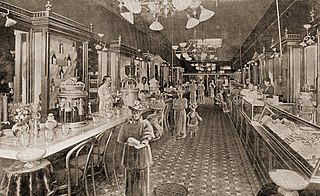
Whitman's is one of the largest and oldest brands of boxed chocolates in the United States. Whitman's confections have been produced since 1842, originally by Stephen Whitman in Philadelphia and currently by Kansas City, Missouri-based Russell Stover Candies.
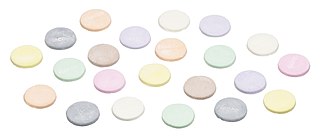
Necco Wafers are a sugar-based candy, sold in rolls of variously-flavored thin disks. First produced in 1847, they became the namesake and core product of the now-defunct New England Confectionery Company (Necco), which operated near Boston, Massachusetts. Production of the candy was suspended in July 2018 when Necco went into bankruptcy, but returned in May 2020 after purchase of the brand and production equipment by the Spangler Candy Company.

The Hershey's Milk Chocolate Bar is a flagship chocolate bar manufactured by The Hershey Company. Hershey refers to it as "The Great American Chocolate Bar". The Hershey Milk Chocolate Bar was first sold in 1900.

Necco was an American manufacturer of candy created in 1901 as the New England Confectionery Company through the merger of several small confectionery companies located in the Greater Boston area, with ancestral companies dating back to the 1840s.

Cadbury Roses is a brand of chocolates made by Cadbury. Introduced in the UK in 1938, they were named after the English packaging equipment company "Rose Brothers" based in Gainsborough, Lincolnshire, that manufactured and supplied the machines that wrapped the chocolates.

Sky Bar is an American candy bar introduced by Necco in 1938, discontinued in 2018, and reintroduced in 2019 by the Sky Bar Confectionary Company. Each Sky Bar has four sections, each with a different filling—caramel, vanilla, peanut, and fudge—all covered in milk chocolate.
The Clark Bar is a candy bar consisting of a crispy peanut butter/spun taffy core and coated in milk chocolate. It was introduced in 1917 by David L. Clark and was popular during and after both World Wars. It was the first American "combination" candy bar to achieve nationwide success. Two similar candy bars followed the Clark Bar, the Butterfinger bar (1923) made by the Curtiss Candy Company and the 5th Avenue bar (1936) created by Luden's.

Riesen is a confectionery of chocolate and chocolate-flavored caramel produced and distributed by August Storck KG, a German confectioner that also produces Werther's Original. In the US, the candy is individually wrapped and sold in medium, large, and club-sized bags. In the UK, the toffees come loose in packs of five, and individually wrapped in sharing bags. It consists of bite-sized pieces of chewy chocolate caramel covered in dark chocolate.
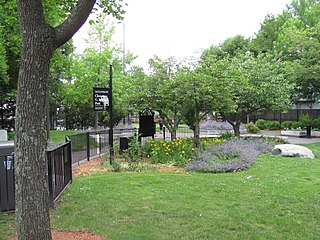
The Port, formerly Area 4, is a neighborhood of Cambridge, Massachusetts, roughly between Central Square, Inman Square, and MIT. It is bounded on the south by Massachusetts Avenue, on the west by Prospect Street, on the north by Hampshire Street, and on the east by the Grand Junction Railroad tracks. Area 4 is a densely populated residential neighborhood with about 7,000 residents.

Salted Nut Roll is a candy bar made by the Pearson's Candy Company of Saint Paul, Minnesota and is available in the Midwestern United States.
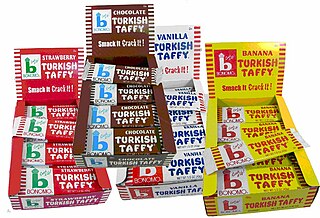
Turkish Taffy is a "chewy" taffy-like candy bar, which comes in several flavors.
The Hollywood Candy Company, or Hollywood Brands, was an American confectionery company formed in Hollywood, Carver County, Minnesota, in 1912 by Frank Martoccio.

Bun Bars are a line of candy bars manufactured by Pearson's Candy Company of Saint Paul, Minnesota, and available in the United States. Despite the name, Bun Bars are not bars at all, but actually round and flat, containing a disc made of maple or vanilla-flavored crème, or caramel, coated in milk chocolate and topped with a roasted peanut-chocolate cluster.

Crunch is a chocolate bar made of milk chocolate and crisped rice. It is produced globally by Nestlé with the exception of the United States, where it is produced under license by the Ferrara Candy Company, a subsidiary of Ferrero.

A candy bar is a type of candy that is in the shape of a bar. The most common type of candy bar is the chocolate bar, including both bars made of solid chocolate and combination candy bars, which are candy bars that combine chocolate with other ingredients, such as nuts, caramel, nougat, or wafers.